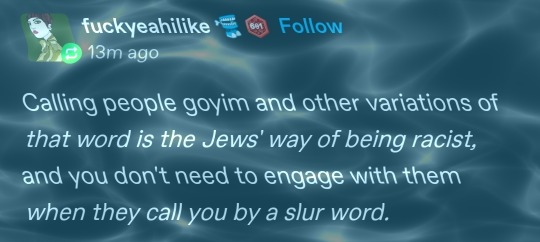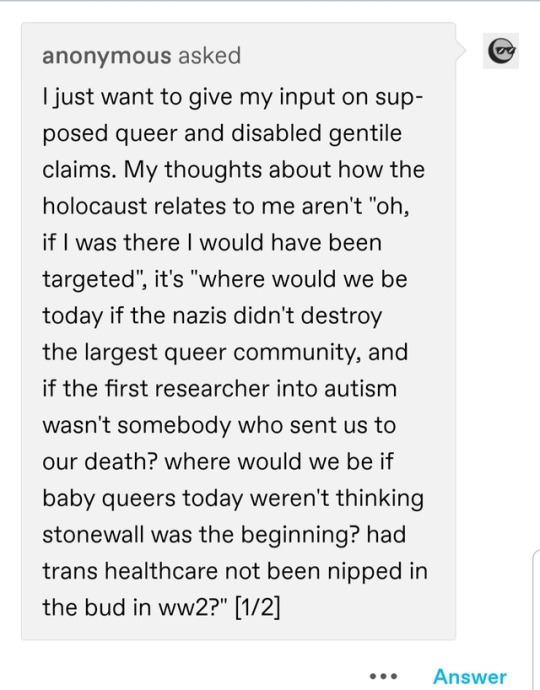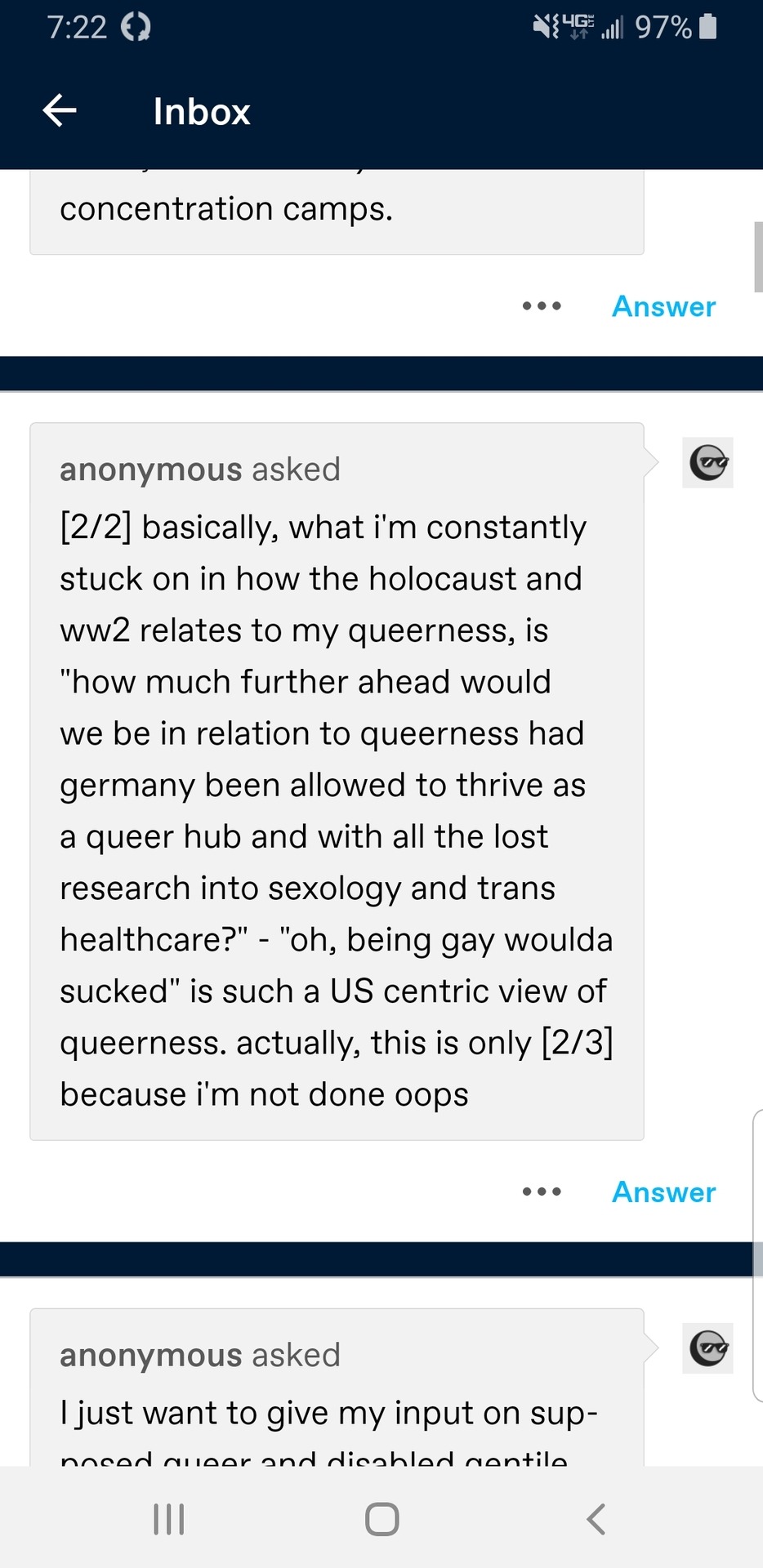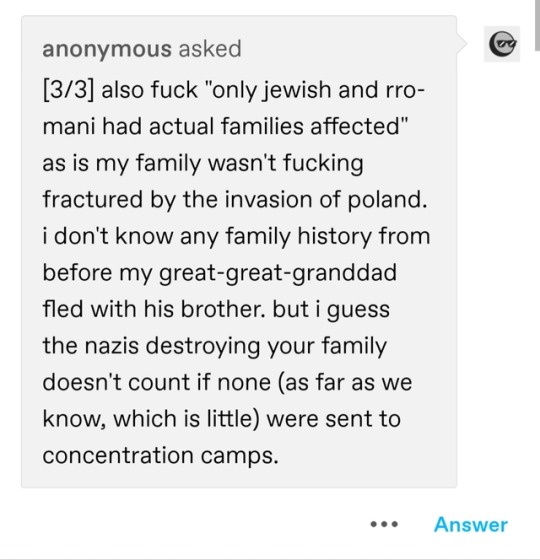#so when people who aren't Jewish just use it without understanding the context we're so careful to maintain
Explore tagged Tumblr posts
Text
Ok I wrote a bunch, and then I realized that there's an unrelated secondary problem:
Kafir is decidedly not the same thing.
Wikipedia says, "Kafir is an Arabic term in Islam which refers to a person who disbelieves the God in Islam, denies his authority, rejects the tenets of Islam, or simply is not a Muslim—one who does not believe in the guidance of Muhammad, the Islamic prophet.
"Kafir is often translated as 'infidel',[6][7] 'pagan', 'rejector',[8] 'denier', 'disbeliever',[3] 'unbeliever',[2][3] 'nonbeliever',[2][3] and 'non-Muslim'.[9] The term is used in different ways in the Quran, with the most fundamental sense being ungrateful toward God," etc.
This is not a comparable term. "Goy" does not also mean disbeliever, unbeliever, one who has rejected Judaism, etc.
The difference is that Islam, like Christianity, is a "universal religion." A religion that actively seeks converts, and which kinda thinks everyone would be happier if they joined it.
Judaism, however, is an ethnoreligion. It's a set of spiritual practices and traditions that a specific ethnic group uses to pass down its culture and history. It doesn't seek converts. In fact it makes converting pretty difficult, even if you're doing it for a common reason like marrying into the tribe.
In Jewish culture, outsiders aren't "people who did a silly/bad thing by rejecting our obviously true faith." They're "normal people."
We're extremely aware that we're the exception to the rule.
Like: as an American, I perceive Muslims as an oppressed group, but in most countries they're in a position of power.
When I looked up terms for non-Muslims, the first result was dhimmis... non-Muslims who are formally second-class citizens.
Then there were a bunch of specific neutral terms, e.g. for polytheists. And then there was kafir. Which clearly CAN be used to just mean non-Muslim, but which also can carry connotations like "unbelievers," and is sometimes used to insult or call out Muslims, or to refer specifically to people who are anti-Muslim.
That's very different from "goyim." The only way "goyim" is used as an insult is with a connotation of "surprisingly ignorant outsiders who could have literally googled this."
As for what I'd already written:
"if an English speaker does not wish to be called goyim" -- Goyim, "people who are not Jewish," is the plural. A goy, "a person who is not Jewish," is the singular.
These are nouns, not adjectives. Goyische is generally the adjective form.
I'm not pointing this out to be a grammar nerd. Partly, I'm pointing it out because if someone says "I don't want to be called a goy," they're talking about someone describing them personally.
Using the term "goyim" to talk about "non-Jewish people" in general, without having to type out three separate words, doesn't mean anything about specific individuals.
If I write, "argh could the goyim please stop putting Passover matzah in their supermarket Hanukkah displays," my supportive non-Jewish friends aren't going to think I'm personally attacking them somehow.
Just like if I say "oh lord, the cis perception of trans people is getting alarming" on a post about far-right school boards, my cis friends aren't going to get confused and think that I think they agree with far-right school boards. They can draw meaning from the context.
"Non-Jewish people" or "people who aren't Jewish" just feels so incredibly awkward to spell out.
I'm also pointing it out because this is the difference between, say, "goy" and "cis" or "straight."
The latter two are adjectives: cis person, straight people. Goyim, by contrast, are automatically people.
It's not like calling someone straight implies they're inhuman.
It's more like... As a queer trans person, I can at least understand that a straight cis person who has negative feelings about queer trans people might bristle at being described as specifically as we are.
Someone who's used to just being "normal," and seeing us as "abnormal," might take pride in being straight and cis.
But they might also feel like it's gross that we have words for talking about gender and sexuality. They might want to live in a world where there's just "normal," and where people don't talk about these things.
We definitely live in a world where some people don't want Jews to exist. Barely a year ago, a group that thinks Jews corrupt society committed mass mutilation, torture, and murder for that very reason.
I'm sure that people who have negative feelings about Jews perceive "goyim" as an insult, a slur.
If I perceived "Jews" negatively, I think hearing a term that identified me as a person who isn't Jewish -- as if Jewish is sometimes the default?! -- would be very jarring to me.
I'll go even farther: There's legitimately something jarring about finding out that a group you're not a part of perceives your group as Potentially Negative Outsiders.
Probably all of us here care pretty deeply about owning our privilege in some area or another. About being aware of where we're part of an oppressor group, trying to unlearn the biases we've unintentionally absorbed from the world around us, and demanding that our own oppressors do the same.
And finding out that yet another group you're not a part of perceives your group as Outsiders With Power-Over is jarring.
Maybe more so if you're unaware of what the group experiences that makes it need separate words for you versus them.
I'm sure all of us in this conversation have one or more oppressor groups. We all know that even a neutral and common term like "men" sometimes means "those outsiders who treat us badly," or worse.
But by the same token, we also know that that's on them.
It doesn't inherently mean that. It doesn't necessarily mean that. It doesn't even mean that most of the time, except in certain contexts and circles. (E.g. a discussion of systemic sexual violence.)
It only means that when that's what we need to talk about. The rest of the time, it's just a neutral identifier for one group of humans.
calling nonjews...nonjews... is not racist pls find an actually real problem to worry about

2K notes
·
View notes
Text



Yeah, there's a lot to be said about the historical, medical, and literary losses experienced during WW2 and the way that this narrative being pushed seriously damages our own senses of self.
Most people aren't thinking "oh how nice it would be to have been at risk for death in a genocide" or some other tomfoolery like these folx keep insisting they must. Most people are a) remembering loved ones they lost (coincidentally, this whole business has convinced me and my family to go back thru our family records and revisit some old memories and family knowledge and hoo boi did that result in some interesting new discoveries because it's been a while, and other family members have found new records and documents that we didn't know about before), b) thinking about the very simple fact that not so long ago, entire swaths of the world were convinced they should be horrifically tortured/murdered and that doesn't bode well for our current rate of de-evolution, c) speaking of our current rate of de-evolution and the direct comparisons that are being made by both survivors and expert historians, people are wondering just how concerned they need to be about their own selves right here and now, d) people are realizing (and no matter how often we have this convo, there will always be some person who has been so cut off that this is the first they're hearing of it) that "holy shit people like me existed in the world, and there's not this stalwart absence where my sense of placement and self should be anymore because actually that absence is man-fucking-made", e) that man-made loss itself is extremely notable, as you say. There was successful gender reassignment surgery way back when, there were records of queer experiences and acknowledgement of queer humanity that we will never get to read again because the nazis burned it, eugenicist science performed in the camps on disabled bodies has formed the unquestioned backbone of massive portions of medical and psychological sciences for a CENTURY and we're only just now beginning to successfully dismantle that, these are not trivial realities, and lastly f) a not insignificant portion of victims was American expats who came from marginalized US communities to live in Europe because during the first world war they realized that not every place was like their own home where they were treated as subhuman, only to find themselves in the middle of a genocide.
The realities of the holocaust, let alone of WW2 as a whole, are FAR more complex and far reaching than this narrative allows for. It is critical that we acknowledge that. Because a HUGE amount of neo-nazi radicalization relies on a base understanding of the holocaust as an aberrant event disconnected from any other aspect of history and modern society, and which occurred so long ago that it could no longer be relevant to anyone today. Agreeing with that premise doesn't EVER protect Jews, because it inevitably eventually turns into "so why are YOU so worked up about it still when everyone else has gotten over it".
Not to mention - and this is where I'm gonna really fuck myself tbh so like...whatever - this all sprang up again somehow, miraculously, right after Bibi realized he was losing his fucked up grip on Israeli politics and his predecessors might expose him, his administrations, and their political and military decisions for the monstrosities that they were. Which I wouldn't normally bother connecting to this only he deliberately raised the spectre of the "11 million myth" again juuuuuust before Tumblr started spouting the same words like a fucking broken spigot. Tumblr is well known for getting it's views on Judaism and Jews from some of the more insanely conservative and orthodox Jewish cults, which are the same ones Bibi happens to rely on and ally with, and it doesn't surprise me at all that Tumblr has become saturated in this particular brand of fucked up holocaust denial as a result.
I'm not gonna get into my feelings on Israel which are deeply complicated both as a result of my upbringing and my research/work/specialties. But like. Bibi and his ilk have been actively harmful to every Jewish population living outside of Israel and have not spared a thought to abandoning us to all manner of genocide, hate crimes, and abuses because - and this is critical - he thinks of us as traitors and not real jews. This is an administration that has denied the Jewishness of children and grandchildren of Jewish holocaust survivors because the families had gone Reform after the holocaust and "Reform isn't real Judaism". This is an administration that believes interfaith marriages aren't real and there are no black Jews left in the world. This is an administration that has actively allied itself with right wing extremists, the current US President (45) and fucking neo-nazis without so much as batting an eye. This is an administration that has actively fought against LGBT+ rights. This is an administration that has actively passed laws saying major swaths of the population of their country DON'T HAVE CIVIL RIGHTS AT ALL. Why the fuck anyone would trust their views on ~anything~ is beyond me. At this point, anyone who finds themselves agreeing with this administration on anything should do some serious soul searching and outside research in order to make sure they haven't been fed a pile of misinformation because NOTHING they say should be trusted.
In much the same way as the United States currently has an administration that actively works against the interests of it's people both at home and abroad, Israel has that in Bibi. I wish more of these Tumblr folx had the context to understand that. No matter what they think, this narrative doesn't "center Jews". It hurts us.
9 notes
·
View notes
Note
in addition to misused Kabbalah (Cabalah/Qabala/etc) which is rampant, I frequently see Hebrew letters, or rarely, words, mixed into things basically for the Aesthetic (because it's ~more mystickal~ than English)
examples from tarot cards because I haven't delved deeply into Wicca itself: RWS Wheel of Fortune has a squiggle replacing one of the letters in the name of g-d, but the intent is obviously there and was explicitly mentioned in the guidebook I had. there's another deck that I don't remember the name of that I can picture (might have been called Sun and Moon Tarot or something else similarly generic? very pretty art otherwise) that has random Hebrew letters in every Major Arcana card, but like? not even by their numeric value, just randomly assigned
also "wow if you draw the symbols of the four elements on top of each other you get the Star of David what a Mystical Coincidence" no there's just only so many shapes you can generate with equilateral triangles and a majority of Jewish people find no significance in that so you probably shouldn't insist it's a bigger thing than it really is.
I wanted to learn more about how Wicca/Pagan cultures appropriate pieces of Judaism. I’m trying to help educate a friend who wants to learn but google is absolutely no help. Thanks!!
#also i can't prove that using Sabbat to mean celebration is a ripoff of shabbat the day of rest but it's pretty suspect in my book#kabbalah is the biggest example because even within judaism you have to have studied Enough before you can even touch Kabbalah#so when people who aren't Jewish just use it without understanding the context we're so careful to maintain#it's a slap in the face#the difference between appropriation and appreciation is whether something is intended to be shared#Christians borrowing the Jewish habit of writing god as g-d in English as a nod to being very careful about where it's written in Hebrew?#wonderful; fine#people writing the name of g-d on the floor in their ritual circle to invoke Them? not cool! don't do that! (yes I've seen it done)#taking Kabbalah out of context when Judaism works so hard to ensure Jewish ppl have context before learning it? not cool#the shabbat/sabbat thing is leaning towards okay since shabbat is technically 'our biggest holiday'#but making sabbats about few-times-a-year holiday things instead of about regular rest makes me personally uncomfy with it#is this discourse do I need a tag for it?
35 notes
·
View notes
Text
This is apparently rather late-breaking so I can't say for sure what (or if) the Pope is going to say (or has and I missed it) about this in light of the response. It was the Congregation for the Doctrine of the Faith who made the decision that using "we" instead of "I" in baptism is not only illicit but also invalid. (Had they decided that it was illicit but not invalid, this wouldn't have been an issue) This led to, well, as you can see, a big upset.
But what the (arch?)Diocese of Detroit said is that while God is bound to the sacrements, God is not bound by the sacrements. So, if catholics do all the steps of whatever sacrement(s) correctly, which includes the proper intention and whatnot, that's the individuals upholding their side of the agreement and so God is required then to uphold God's side and bestow the relevant appropriate grace/blessing/forgiveness. If, however, there is some issue in the sacrament's preparation through accident but the intention is the same - so, in this case, the intent to baptize in the triune God within the concepts of the Roman Catholic church, and fulfilling all the known requirements - God is still able to bestow the same blessings as in a valid baptism. And now we're getting a little further away and into more opinion territory, but why wouldn't God?
Yes, catholicism is legalistic but to what extent? I certainly understand the tradition and the catholic stance that acts matter more than beliefs - I grew up catholic and am on my way to becoming Jewish - but are we really going to say God somehow didn't notice a baptism was happening bc the priest used the wrong pronoun? Or that God cares so much about it that God wouldn't follow through? (And this is not me hand-waving the issue away! This is me engaging in good faith - I am very much trying to stay within the context of the catholic church for this.)
And to get a little further in the weeds - how could we say that intent and ignorance doesn't matter? Intent and ignorance matters in terms of sin. If you don't understand or know that it's sin when you do it, it's just a mistake. (This is different than the Jewish concept of sin with which I'm familiar, which is that sin is a misstep, if you will, and that you definitely can sin without meaning to) That's evidence that intent matters, that the ignorant are spared. Thus, I posit we can say that the catholic theological perspective is that you cannot be punished for not knowing. (this also aligns with both the updated teaching that babies who die before they can be baptized are "entrusted to the mercy of God" (1992 catechism) with the assumption that God is, well, merciful, and the idea that people who haven't ever heard of Jesus aren't rejecting him and thus are in a different category than those who do. I don't have sources for the second part whatsoever, it's just what I was told as a child when concerned about non-catholics.)
And my last argument: Orthodox baptisms use a different formula and have been valid in the eyes of the Roman catholic church since the Council of Florence, held way back in 1430s and 40s.
To answer @unbidden-yidden 's question about getting rebaptized: yup. Sure can. Can also get quietly remarried, if there are concerns. Only one member of the couple needs to have had a valid baptism for the marriage to be valid, though. As for confession: any confession done with a valid priest after any confessions done with an invalid priest handles whatever "leftover sin" there would have been, if you believe there was any. So basically, so long as you're still alive, you can go to confession and have any sins derived from an invalid priest performing sacraments forgiven.
Last rites is a stickier issue, if you maintain that invalidly baptized priests are thus invalid priests. The only thing I've got for that is... How many people who received last rites from an invalid priest had unconfessed mortal sin hanging over them? Probably very few.
Personally, though? I cannot bring myself to believe that the invalid baptisms of priests has inadvertently brought sin upon individuals to whom he's administered or even invalidated his baptism in any way whatsoever. Yes, catholics have ritualized prayer. No, it's not a password for entry into the church. Yes, words and rites matter. No, not so much that a good-faith attempt at a sacrament can be invalidated. To me, that just undermines the power of the sacraments*. That undermines the mercy and understanding of God and quite frankly casts God as either nitpicky to the point of ridiculousness, which I dismiss out of hand, or beholden to man-made rituals (hm).
*I don't believe catholic sacraments have inherent power but they're powerful and meaningful to the folks who believe they do. I don't believe any of anymore but I did my best to engage within the context and teachings of the catholic church.
I love the latest controversy in the Catholic church! Some priests haven't been doing baptism right and because they decided those are all void they gotta deal with the implication they sent people to hell as a bit of a whoopsie.
44K notes
·
View notes